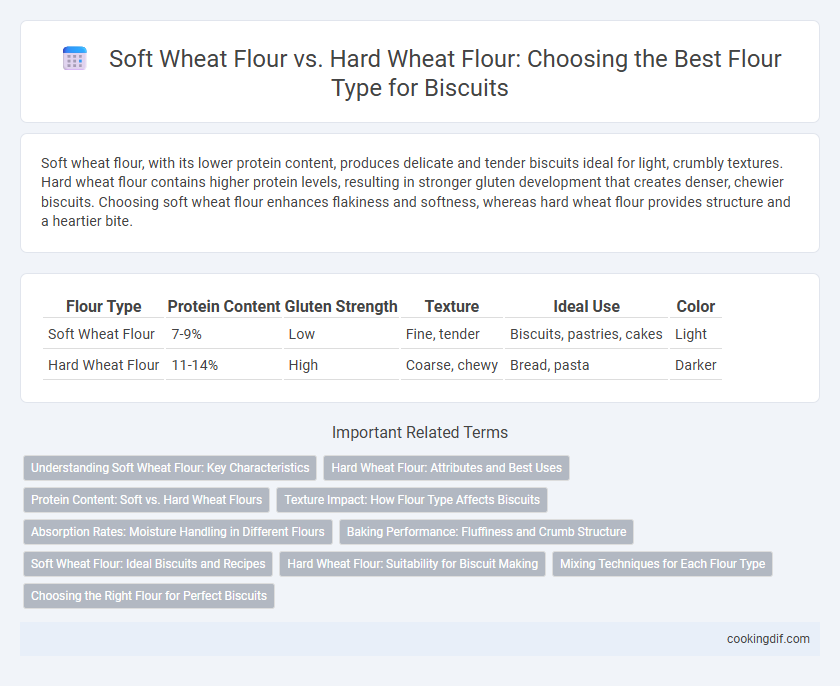Soft wheat flour, with its lower protein content, produces delicate and tender biscuits ideal for light, crumbly textures. Hard wheat flour contains higher protein levels, resulting in stronger gluten development that creates denser, chewier biscuits. Choosing soft wheat flour enhances flakiness and softness, whereas hard wheat flour provides structure and a heartier bite.
Table of Comparison
| Flour Type | Protein Content | Gluten Strength | Texture | Ideal Use | Color |
|---|---|---|---|---|---|
| Soft Wheat Flour | 7-9% | Low | Fine, tender | Biscuits, pastries, cakes | Light |
| Hard Wheat Flour | 11-14% | High | Coarse, chewy | Bread, pasta | Darker |
Understanding Soft Wheat Flour: Key Characteristics
Soft wheat flour, primarily used in biscuit production, contains lower protein content (7-9%) compared to hard wheat flour, resulting in a tender and crumbly texture ideal for delicate baked goods. Its fine milling process enhances moisture absorption and creates a light, soft crumb structure, essential for achieving classic biscuit fluffiness. The low gluten formation in soft wheat flour minimizes toughness, making it the preferred choice for producing biscuits with optimal softness and product quality.
Hard Wheat Flour: Attributes and Best Uses
Hard wheat flour contains higher protein content, typically ranging from 12% to 14%, which contributes to stronger gluten development and a denser texture in baked goods. This flour type is ideal for biscuits requiring a chewy or firm crumb, such as savory biscuits or those that need to hold their shape well during baking. Its resilience makes hard wheat flour preferred for recipes demanding structure and durability, distinguishing it from the tender outcome of soft wheat flour used in delicate biscuits.
Protein Content: Soft vs. Hard Wheat Flours
Soft wheat flour typically contains lower protein content, around 8-10%, making it ideal for producing tender, delicate biscuit textures that crumble easily. Hard wheat flour, with protein levels ranging from 12-14%, develops more gluten, resulting in firmer, chewier biscuits suitable for recipes requiring structure and elasticity. Selecting the appropriate flour based on protein content is crucial for achieving the desired biscuit softness or density.
Texture Impact: How Flour Type Affects Biscuits
Soft wheat flour contains lower protein levels, resulting in less gluten formation and producing tender, flaky biscuits with a delicate crumb. Hard wheat flour has higher protein content, leading to more gluten development that can create denser, chewier biscuits with a firmer texture. Choosing soft wheat flour optimizes biscuit softness, while hard wheat flour enhances structure but may compromise lightness.
Absorption Rates: Moisture Handling in Different Flours
Soft wheat flour absorbs less moisture due to its lower protein content, resulting in a tender, delicate biscuit texture. Hard wheat flour, with higher protein, has higher absorption rates, which requires more liquid and yields a denser, chewier biscuit. Adjusting moisture content according to flour type is essential for achieving the desired biscuit consistency and crumb structure.
Baking Performance: Fluffiness and Crumb Structure
Soft wheat flour, with its lower protein content, produces biscuits with superior fluffiness and a tender crumb structure, ideal for achieving a delicate texture. Hard wheat flour contains higher gluten-forming proteins, resulting in denser biscuits with a chewier crumb that may lack the desired lightness. For optimal baking performance targeting soft, airy biscuits, soft wheat flour is preferred due to its ability to minimize gluten development and enhance crumb softness.
Soft Wheat Flour: Ideal Biscuits and Recipes
Soft wheat flour, with its lower protein content (around 8-10%), produces tender, flaky biscuits perfect for delicate textures. Its fine gluten development results in softer, lighter dough, ideal for classic buttermilk biscuits and scones. Recipes using soft wheat flour yield consistently moist and crumbly baked goods compared to the denser texture from hard wheat flour varieties.
Hard Wheat Flour: Suitability for Biscuit Making
Hard wheat flour, characterized by its higher protein content (typically 12-14%), is less suitable for biscuit making due to its stronger gluten development, which results in a denser and chewier texture. Biscuit recipes generally require soft wheat flour with lower protein (8-10%) to achieve a tender, crumbly, and melt-in-the-mouth consistency. Using hard wheat flour in biscuit production often compromises the desired lightness and softness essential for quality biscuits.
Mixing Techniques for Each Flour Type
Soft wheat flour, with its lower protein content, requires gentle mixing techniques to prevent overdeveloping gluten, resulting in tender and flaky biscuits. Hard wheat flour, higher in protein, benefits from more vigorous mixing to build sufficient gluten structure, producing chewier and more structured biscuits. Adjusting mixing time and intensity based on flour type ensures optimal biscuit texture and consistency.
Choosing the Right Flour for Perfect Biscuits
Soft wheat flour contains lower protein (7-9%) compared to hard wheat flour's higher protein content (11-14%), making soft wheat ideal for tender, flaky biscuits due to its lower gluten development. Hard wheat flour leads to denser, chewier textures unsuitable for delicate biscuit crumb structures. Selecting soft wheat flour ensures optimal moisture absorption and light, airy biscuits that meet bakery quality standards.
Soft wheat flour vs Hard wheat flour for flour type Infographic

 cookingdif.com
cookingdif.com